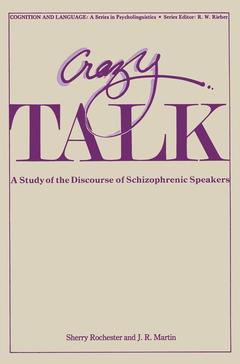Crazy Talk, Softcover reprint of the original 1st ed. 1979 A Study of the Discourse of Schizophrenic Speakers Cognition and Language: A Series in Psycholinguistics Series
Langue : Anglais
Auteur : Rochester Sherry

This book is a study of discourse-the flow of talk-of schizophrenic speakers. Our goal is to understand the processes which account for the ordinary flow of talk that happens all the time between speakers and lis teners. How do conversations happen? What is needed by a listener to follow a speaker's words and respond appropriately to them? How much can a speaker take for granted and how much must be stated explicitly for the listener to follow the speaker's meanings readily and easily? Each time we ask these questions, we seem to have to go back to some place prior to the "ordinary" adult conversation. This time, we have tried reversing the questions and asking: What happens when conversa tion fails? Prompted in part by an early paper by Robin Lakoff to the Chi cago Linguistics Society and by Herb Clark's studies of listener processes, we wondered what a speaker has to do to make the listener finally stop making allowances and stop trying to adjust the conversational contract to cooperate. This inquiry led us to the schizophrenic speaker. When a listener decides that the speaker's talk is "crazy," he or she is giving up on the normal form of conversation and saying, in effect, this talk is ex traordinary and something is wrong. We thought that, if we could specify what makes a conversation fail, we might learn what has to be present for a conversation to succeed.
1 Thought Disorder and Language Use in Schizophrenia.- I. Discourse Failures and the Schizophrenic Speaker.- II. Studies of Language Use in Schizophrenia and Their Premises.- III. The Study of the Schizophrenic Speaker in Light of Prior Work.- IV. A Final Comment.- 2 Procedures.- I. Introduction.- II. Describing the Sample.- III. Preliminary Analyses.- 3 Cohesion.- I. Introduction.- II. Cohesion Procedure.- III. Results.- IV. Discussion.- 4 Reference as a Speech Art.- I. Reference and Phoricity.- II. Procedures.- III. Analyses of Nominal Group Structure.- IV. Discussion of Complexity in Nominal Groups.- 5 Presenting Information in Texts.- I. Introduction.- II. General Reference.- III. Presenting Participants in the Text.- 6 Presuming Information from the Culture and from the Situation.- I. Text and Context.- II. Presuming the Context of Culture.- III. Presuming the Situational Context.- 7 The Discourse of Schizophrenic Speakers: A Discussion.- I. Introduction.- II. Discriminating among the Groups of Speakers.- III. Implications of the Results for the Language Abilities of Schizophrenic Speakers.- IV. Some Hypotheses to Account for Discourse Failure.- Appendix 1.- Appendix 2.- References.
Date de parution : 12-2012
Ouvrage de 229 p.
15.5x23.5 cm
© 2024 LAVOISIER S.A.S.



